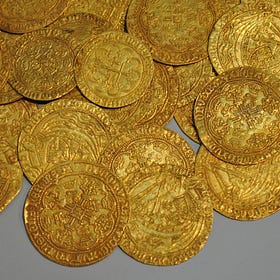The Gospel of Judas
Tags: Bible Snark, 30 Coins, Apocrypha
I bought a translation of the Nag Hammadi scriptures (The Nag Hammadi Scriptures: The Revised and Updated Translation of Sacred Gnostic Texts, edited by Marvin Meyer) some time ago, but hadn’t started reading it yet. Thanks to 30 Coins, I’ve now read my first scripture: The Gospel of Judas. This gospel is one of the apocrypha and a Gnostic text from the Sethian tradition. The original was in Greek and may have been written in the middle of the II century. The text found in Nag Hammadi is a Coptic translation from the late III or early IV centuries.
WUT?
I’m used to confusing verses and Biblical weirdness, but I admit that I had some difficulty following parts of this. The fact that there are bits missing, which turns some passages into a collection of meaningless words, didn’t help; and neither did the overcomplicated Sethian view of the divine hierarchy. What did help was googling about Gnosticism, of which the Christian Sethian tradition is part of, and reading the introductions to this text and some of the others. It felt way too much like homework for my liking, but I persevered.
THE LAUGHING JESUS
The Jesus in The Gospel of Judas laughs a lot and is very condescending towards his disciples, even Judas. At one point he says that he ‘went to a different generation, one that is great and holy’, but when his disciples ask him about ‘the great generation that is exalted over us and is holy, but is not present in these realms’, he laughs (of course) and asks why they’re thinking about it. Hmm, because you mentioned it? Jerk. Oh, but laughter isn’t the only thing that sets this Jesus apart from the other Jesuses.
Judas said to him, “I know who you are and from what place you have come. You have come from the immortal realm of Barbelo, and I am not worthy to pronounce the name of the one who has sent you.”
According to the introduction, Barbelo is the divine Mother in Sethian mythology. Before this, Laughing Jesus had already shocked his disciples by referring to God as their god, and basically denying he was his son. All this is because the Sethians added several more layers of divine hierarchy to the standard Christian model. So, there’s a Great Invisible Spirit living in a super exclusive ‘great and infinite realm’. It was in that realm that the GIS created the first angel, the Self-Generated, with the help of a cloud of light. The Self-Generated in turn created thousands more angels, and luminaries, and emanations. All this is the cosmos. At one point, 2 angels, Nebro, aka Yaldabaoth, and Sakla came out of one of the several angel-generating clouds floating around. Sakla is God, and, considering his name means ‘rebel’, Nebro must be Satan. Naturally, they immediately started fighting and… Nope, instead they teamed up to create some more angels and the first humans, Adam and Eve, aka Zoe. Except not really because the Gnostics believe the material world is a poor copy of a superior, immaterial realm. So, God is not only working with Satan, but is also just middle management. Maybe it’s why he’s so insecure and in constant need of adoration. According to Jesus, ‘God commanded Michael to give the spirits of people to them on loan, for adoration’. Well, I can’t say it doesn’t match previous portrayals. The real Lord of all, on the other hand, ‘commanded Gabriel to give spirits to the great generation without a king - the spirit and the soul’. This is the generation of Seth, that great and holy generation Jesus went to. At one point, Jesus names the five angels ‘who ruled over the underworld, and first over chaos’, and the first line reads: ‘The first is Seth, who is called Christ’. So, if Christ is Seth, I guess this means that when he was talking about the greatest generation ever he was praising himself. Someone has a big ego.
All this cosmic info-dump is shared only with Judas, though Jesus also tells the other disciples that their God lied on his CV. This made me wonder a) what the hell has he been telling people and b) why did he wait until 3 days before the end of his time among humans to tell his disciples how they’ve been worshipping the wrong divine entity.
VISIONS
After the disciples (except Judas) have a vision of a temple, they ask Jesus to help them understand it. Things get awkward after he asks them about the 12 priests they saw in that temple.
Some abstain for two weeks. Some sacrifice their own children, others their wives, in praise and humility with one another. Some have sex with men. Some perform acts of murder. Some commit all sorts of sins and lawless deeds. And the men who stand before the altar call upon your name, and through all the actions of their deficiency, that altar becomes full.
Jesus complains about all the empty worshipping and then tells them they are the 12 priests. Wait, what? Who’s who? And what the hell have the disciples been up to? In addition to all the murdering, fornication, and gayness, they’re also reinforcing the worship of fake god Sakla, who will use Jesus to get more followers. These are some terrible apostles. Then again, is there a reason why Jesus is taking part in this charade?
Judas had his own, private vision, and it’s not pleasant either. He saw himself be attacked by the other disciples, and a great house with lots of people inside. According to Jesus, that house, which is in the ‘eternal realm’ is not for anyone ‘of mortal birth’ but rather the saints. He also confirms that Judas isn’t exactly going to be universally beloved:
You will be the thirteenth, and you will be cursed by the other generations, but eventually you will rule over them.
That doesn’t sound too bad, but it appears Jesus is as found of establishing deadlines as Sakla…
THE FUTURE
This time, Jesus is generous enough to share his knowledge with all his disciples, though the missing bits make this hard to fully understand.
I tell you the truth, the stars above all bring matters to their end. When Sakla completes his time designated for him, their first star will shine with the generations, and they will bring to completion what has been mentioned. Then they will do immoral things in my name and slay their children, and they will (…) and (…) in my name, and your star will rule over the thirteenth eternal realm.
The ‘thirteenth eternal realm’ bit must be for Judas, to whom Jesus is replying. As for the rest, in my humble, non-expert opinion, it reads like a version of the Apocalypse, only instead of it signalling God’s triumph, it signals his death. And of course, considering the greater complexity of the cosmos in Sethian tradition, it’s far from the End. In fact, it’s likely a good thing.
And now for the moment we’ve all been waiting for: Judas’ betrayal! But was it really a betrayal?
But you will exceed all of them. For you will sacrifice the man who bears me.
So, it sounds like Jesus is telling Judas that his betrayal won’t really kill him, which fits with the Sethian view of the crucifixion as one big joke on Jesus’ executioners and the image of a laughing Jesus mocking his own ‘death’ shows up in other texts. Who wasn’t laughing? Probably the dude whose body Jesus temporarily hijacked. There’s another, less popular interpretation of that passage that claims that Jesus is warning Judas but he still betrays him, which makes him ‘exceed all of them’ in evilness. That doesn’t seem to match with the Sethian version of the crucifixion, though.
The last thing Jesus tells Judas is to look up at a shiny cloud surrounded by stars and one of them goes in. Most think it was Judas, but others say it was Jesus’ spirit, which left his body behind. That may explain why the end is so short. It just says there were scholars ready to grab Jesus during prayer, they talk to Judas, and he hands him over. Really, the last line is: ‘And Judas received some money and handed him over to them’. Even taking into account that the last 5 lines of the previous chapter are missing, that’s pretty abrupt.
REVIEW
I can’t blame whoever wrote this for the missing lines and words, but I can blame them for the extreme boredom. The Gospel of Judas has no memorable characters or passages. I ended up hating Laughing Jesus more than Mutant Lamb Jesus and that one started the Apocalypse; and while this is named after Judas, he doesn’t have any personality. Unlike the other disciples, who at least get to be mad at Jesus’ mockingly cryptic ways, he just listens to Jesus’ info-dumps. The Sethian tradition has the potential for being either intriguing, or hilarious, but the bloated divine hierarchy shows that quantity doesn't equal quality. Sakla and Nebro’s machinations could’ve been fun, but the text doesn’t give many details apart from the basic stuff. 30 Coins made this sound way more interesting.
By Danforth
30 Coins
Now Watching: 30 Coins
We finally started watching Spanish horror streaming series 30 Coins (2020) and judging by the first 3 episodes, it’s going to be a wild ride.
TV Review: 30 Coins Season 1
Spoilery review of season 1 of Spanish horror streaming series 30 Coins.





